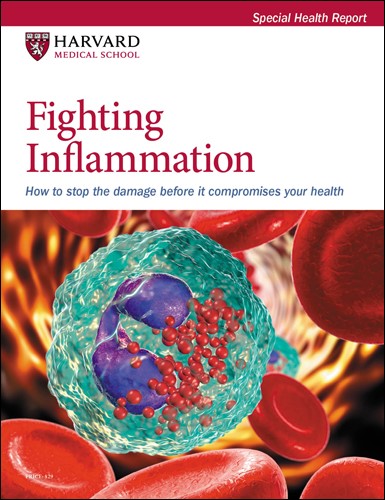Holiday joy can bring painful joint inflammation
Gout attacks can be triggered by foods that are abundant on the holiday buffet.
- Reviewed by Anthony L. Komaroff, MD, Editor in Chief, Harvard Health Letter; Editorial Advisory Board Member, Harvard Health Publishing

Holidays and indulgence often go together, and there's probably not much harm if you partake conservatively in rich meals or an occasional cocktail to toast the season.
Too much indulgence is another story, however, especially if you're at risk for gout — a condition that can cause recurrent attacks of inflammation in the joints of the big toe, feet, ankles, knees, wrists, or hands. And the holidays set the perfect table for a gout attack.
"The holiday connection isn't well studied, but since the days of ancient Rome, it's been observed that drinking excessive amounts of alcohol and feasting on foods high in natural compounds called purines trigger gout in some people," says Dr. Robert Shmerling, a rheumatologist and medical editor of the Harvard Special Health Report Fighting Inflammation (/ui).
A new gout risk factor?A Harvard study published in September 2023 in Arthritis and Rheumatology suggests that measuring a particular molecule might help predict whether people are at risk for gout or recurrent gout attacks. High levels of uric acid in the body have long been considered a primary cause of gout. However, researchers found that high levels of glycoprotein acetyls — a known marker of inflammation — were present in the blood samples of people in the months or years before their first gout attacks. People with lower glycoprotein acetyl levels developed gout less frequently. The glycoprotein acetyl levels also predicted which study participants would have recurrent gout flares. New treatments that target glycoprotein acetyls may one day prevent attacks of gout. |
The gout-purine connection
Purines are essential building blocks of DNA. They're found in all of your cells and in many foods and drinks. As the body processes purines, it creates a byproduct called uric acid, which winds up in the blood. If you make a little extra uric acid, the kidneys remove it and send it out of the body (in urine). If you make a lot of extra uric acid, or if your kidneys don't remove it sufficiently, it builds up in the blood and can form needle-shaped crystals.
The crystals sometimes settle in the joints, causing swelling, stiffness, and severe pain — and that's gout. An attack comes on suddenly, and having one attack increases the risk for having more.
Purine-rich foods
Just like in Roman times, eating a purine-rich diet today contributes to gout. Examples of purine-rich foods include red meats, (particularly game meats), organ meats, legumes, seafood, and some poultry.
On a holiday buffet, that might be roast beef, brisket, lamb or pork chops, veal, chicken liver, or turkey. It could be codfish, trout, haddock, or a dish with anchovies, scallops, oysters, mussels, lobster, shrimp, or crab. Or it might be something simple, such as bean dip, lentil soup, or peanuts.
Some alcoholic drinks (especially beer) contain purines, and all alcoholic drinks can reduce the ability of the kidneys to remove uric acid from the blood. High-fructose corn syrup — the sweetener in soda, fruit punch, some fruit juices, ice cream, and many packaged baked goods (like cookies and cakes) — also contains purines.
Beyond purine risks
A purine-rich diet isn't the only gout risk factor. Whether it's the holidays or any day of the year, these factors raise the odds of developing gout:
- being a middle-aged or older man (although women can also develop gout, typically after menopause)
- having a family history of gout
- having heart disease, high blood pressure, obesity, or kidney problems
- taking diuretics
- being dehydrated.
New thinking on diet
You could shun every food and drink high in purines, but Dr. Shmerling says that's an outdated approach. "Just stick to a plant-based diet, and limit purine-rich foods and drinks, even during the holidays. Don't deprive yourself — enjoy holiday foods. Just don't overdo it, and don't have them often," he says. "And drink alcohol only in moderation."
Dr. Shmerling also advises that you work to reduce other gout risk factors by losing excess weight, controlling blood pressure, addressing heart and kidney problems, and staying hydrated (to help the kidneys filter uric acid from your blood).
If you do develop gout or experience a flare-up, your doctor might prescribe a drug that reduces uric acid levels. Medication, combined with a healthy diet and lifestyle, is often all it takes to avoid gout attacks.
Image: © Ogtay Mammadov/Getty Images
About the Author

Heidi Godman, Executive Editor, Harvard Health Letter
About the Reviewer

Anthony L. Komaroff, MD, Editor in Chief, Harvard Health Letter; Editorial Advisory Board Member, Harvard Health Publishing
Disclaimer:
As a service to our readers, Harvard Health Publishing provides access to our library of archived content. Please note the date of last review or update on all articles.
No content on this site, regardless of date, should ever be used as a substitute for direct medical advice from your doctor or other qualified clinician.
















